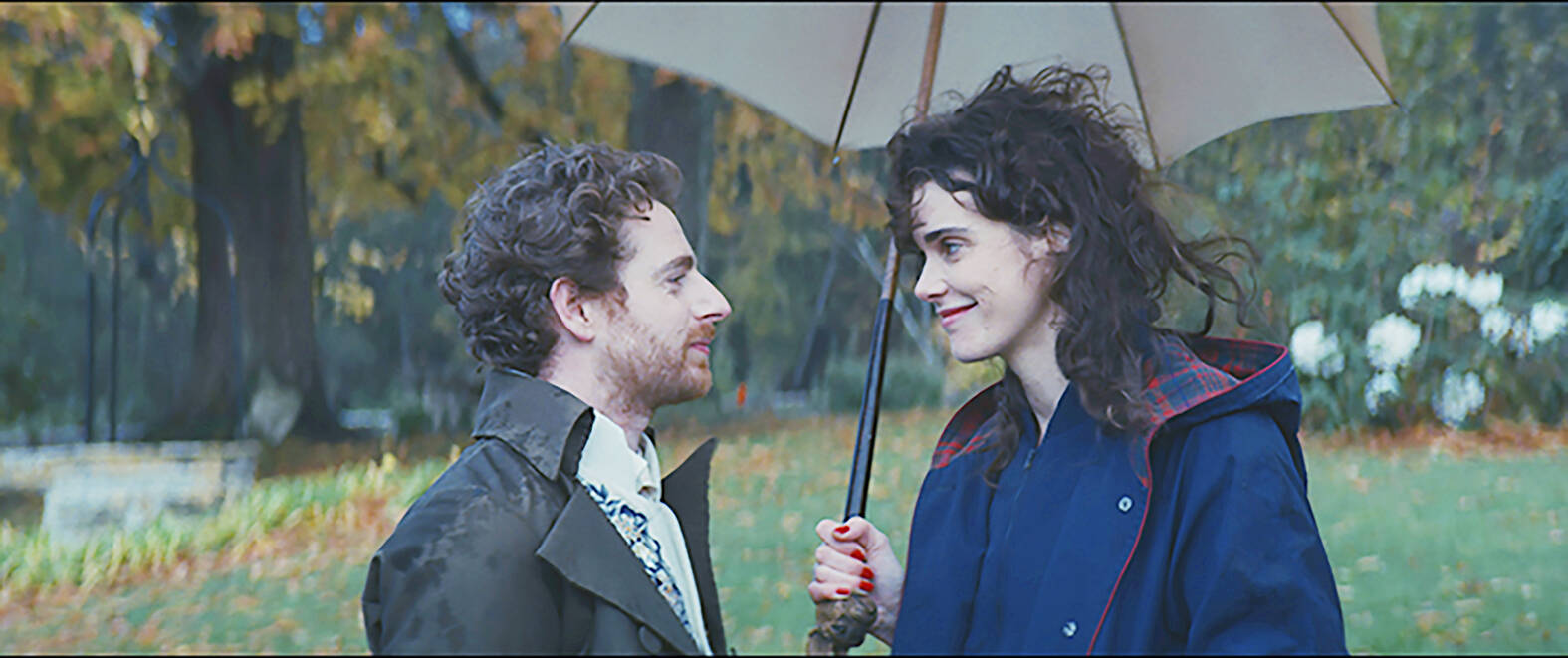Agathe is celibate by choice. The 30-something hero of filmmaker Laura Piani’s feature debut Jane Austen Wrecked My Life, played by the luminous Camille Rutherford, hasn’t so much been ruined by Austen as she has been made acutely aware of her own limitations in both romance and literature.
Neither she nor anyone else is good enough to make any big moves for. So, she sticks to the routine. She works at the legendary Parisian bookstore Shakespeare and Co, and bikes home, where she lives with her sister and young nephew. Sometimes she goes out to dinner. For what it’s worth, Agathe also happens to epitomize French girl chic with her Breton stripes, red pout and effortlessly disheveled hair. There should be Instagram accounts devoted to her navy hooded parka.
Life isn’t bad, it’s just not moving forward. And whatever is going to get her out of this self-imposed rut is going to be something special — she’s read too many great books to accept anything less.

Photo: AP
Standards are great and all, but really, of course, it’s Agathe who has to get out of her own way. And she does, one night, in a sake-induced daze in which she dreams up the first couple of chapters of a romance. Her best friend Felix (Pablo Pauly) gives her the push she needs and secretly submits the pages to a Jane Austen writers residency, where she’s accepted and invited to spend a few weeks.
Before she gets on the ferry (a hurdle in and of itself), Felix, a known serial dater and “breadcrumber,” kisses her. It’s the kind of development, a platonic friendship turned complicated, that’s enough to properly distract an already reluctant writer with an impostor complex. When she arrives, there’s another handsome distraction awaiting her: Oliver (Charlie Anson), a British literature professor and Austen’s “great great great great nephew” who thinks that the Pride and Prejudice author is overrated. Agathe doesn’t know he also speaks French until after she’s complained about his arrogance to her sister within his earshot.
It’s a classic kind of setup, not exactly Mr. Darcy, but not not that either. Shared lodgings, even at a rather large, idyllic English estate, only ratchet up the will-they-won’t-they tension as they see each other everywhere: walks in the woods, breakfast, after-dinner readings. And it’s not without its slightly more cliche hijinks, like Agathe stripping down to nothing and opening a door to what she believes is the bathroom. It’s not.

Photo: AP
Piani has constructed a rare gem in Jane Austen Wrecked My Life, which manages to be literary without being pretentious. Its title is cheekily hyperbolic but has some truth to it as well. Modern romances for Austen disciples are bound to disappoint but, in this environment, they can justify having a costumed ball. The event is a swoony, romantic affair where we get to see the love triangle play out in all its glorious awkwardness.
But while Jane Austen Wrecked My Life certainly qualifies as a romantic comedy, the question of whom she ends up with is kind of beside the point. Don’t worry, choices are made, but the way it plays out is both unexpected and gratifying — a clear-eyed portrait of why Agathe’s singledom is not the problem. There’s even a Frederick Wiseman cameo involved.
Ultimately, this is a movie about a woman taking a bet on herself for perhaps the first time ever. Her actualization is not going to come through a boyfriend, a job or a makeover, but by sitting down and finally putting pen to paper. It may not be a strict adaptation, but it has Jane Austen’s soul.

Last week the story of the giant illegal crater dug in Kaohsiung’s Meinong District (美濃) emerged into the public consciousness. The site was used for sand and gravel extraction, and then filled with construction waste. Locals referred to it sardonically as the “Meinong Grand Canyon,” according to media reports, because it was 2 hectares in length and 10 meters deep. The land involved included both state-owned and local farm land. Local media said that the site had generated NT$300 million in profits, against fines of a few million and the loss of some excavators. OFFICIAL CORRUPTION? The site had been seized

Next week, candidates will officially register to run for chair of the Chinese Nationalist Party (KMT). By the end of Friday, we will know who has registered for the Oct. 18 election. The number of declared candidates has been fluctuating daily. Some candidates registering may be disqualified, so the final list may be in flux for weeks. The list of likely candidates ranges from deep blue to deeper blue to deepest blue, bordering on red (pro-Chinese Communist Party, CCP). Unless current Chairman Eric Chu (朱立倫) can be convinced to run for re-election, the party looks likely to shift towards more hardline

Sept. 15 to Sept. 21 A Bhutanese princess caught at Taoyuan Airport with 22 rhino horns — worth about NT$31 million today — might have been just another curious front-page story. But the Sept. 17, 1993 incident came at a sensitive moment. Taiwan, dubbed “Die-wan” by the British conservationist group Environmental Investigation Agency (EIA), was under international fire for being a major hub for rhino horn. Just 10 days earlier, US secretary of the interior Bruce Babbitt had recommended sanctions against Taiwan for its “failure to end its participation in rhinoceros horn trade.” Even though Taiwan had restricted imports since 1985 and enacted

Enter the Dragon 13 will bring Taiwan’s first taste of Dirty Boxing Sunday at Taipei Gymnasium, one highlight of a mixed-rules card blending new formats with traditional MMA. The undercard starts at 10:30am, with the main card beginning at 4pm. Tickets are NT$1,200. Dirty Boxing is a US-born ruleset popularized by fighters Mike Perry and Jon Jones as an alternative to boxing. The format has gained traction overseas, with its inaugural championship streamed free to millions on YouTube, Facebook and Instagram. Taiwan’s version allows punches and elbows with clinch striking, but bans kicks, knees and takedowns. The rules are stricter than the